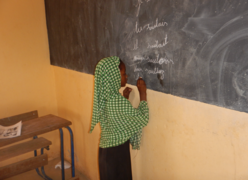October 31, 2018 — Serge Dalexis, Education & Child Protection Coordinator for the IRC in Mali provides his perspective on the crisis.
I’d always felt a pull towards West Africa. My ancestors had been uprooted from there during the slave trade and I have been interested in understanding more about this part of my history. In June 2017, I left my hometown of Petit-Goave in Haiti and boarded a flight to Mali.
Seven years prior, I was working for the IRC in Haiti after the earthquake hit in 2010. The natural disaster devastated my country: millions were affected; thousands of people died and many schools were destroyed. In times of crisis like this, children are at a greater risk. Working in child protection, it was my job to keep the children we were working with safe and protected.
Fast forward to today and I’m still working to ensure children remain safe, but now, in a very different context: Mali. The north of Mali still remains extremely fragile due to in-fighting between armed groups. There is sporadic violence and many people have been forced to flee to surrounding communities and villages to find safety.
The IRC is providing emergency relief, healthcare services and education to thousands of Malians caught in the midst of the conflict.
Here are three things I’ve learnt since moving:
1. When it comes to education – the building matters
There are over 1 million children and over 700,000 teenagers not in school in Mali. Many schools have been destroyed or abandoned and have no supplies. In some cases, children don’t even have chairs to sit on.
With funds from the EU, the IRC is repairing, stocking and building schools in Northern Mali. Having a safe building packed with supplies makes a huge difference in motivating teachers and students.

When we’re constructing a school, the community will come often to the site to see how it’s progressing. People see that we’re putting in time and money and it sends a clear message to parents that education is important. Once all the furniture’s in place, you can see the eagerness of parents to send their children to the school.
A lot of the work we do is communicating on the importance of education, particularly to parents with girls. We’re striving towards ensuring every child in Mali can receive the education they deserve.
2. Programming can’t be one-size-fits-all
There are lots of different ethnicities in Mali and it’s been a big learning curve understanding how to tailor our programming to different groups. For example, women have different roles in different communities, so you have to tailor your programmes accordingly. You certainly cannot take a one-size-fits-all approach as it just doesn’t work in this context.
3. You’ve got to stay adaptable
The situation is extremely volatile in Mali so you have to remain flexible. Armed groups occupy schools or have their base close to schools. Roads can become too dangerous to drive down. The situation can change suddenly. It’s incredibly difficult to travel around Mali safely, our team are often forced to get planes between different locations, which cannot supply for the demand. We’ve got to constantly adapt to the environment and find different solutions when problems occur.
I’ve learnt a huge amount working in Mali and continue to learn every day.
Funded by ECHO EU Humanitarian Aid, the International Rescue Committee train teachers and rehabilitate schools in Mali to provide children with education.